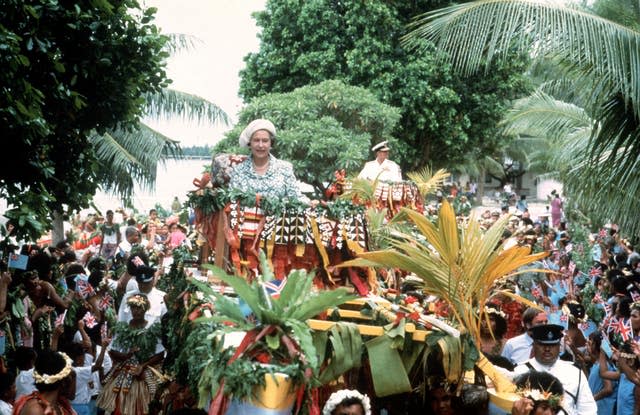Queen was the Commonwealth’s ‘psychotherapist’
The Queen saw the Commonwealth as a “family” and took great pride in its success.
Although she was its symbolic head, she had no formal powers over the 56 countries and the 2.4 billion citizens which make up the voluntary association.
The Duke of Edinburgh once described his wife as the “Commonwealth psychotherapist”, a nod to her informal talks with heads of government at the biennial Commonwealth Heads of Government Meeting (CHOGM).

She was said to have brought a calmness to the Commonwealth and inspired loyalty among its members.
The Queen firmly believed that the Commonwealth’s role was to act as a force for good in the world.
She summed up her views in her Commonwealth Day speech of 2003.
“It is a unique global grouping, spanning every region of the world and including in its membership countries of all sizes and stages of development,” she said.
“It is an association of peoples as well as governments and … it is a body which values the richness of its diversity.”
Professor Ben Pimlott, her biographer, once summarised the Queen’s thoughts on the Commonwealth: “Though the Commonwealth has changed greatly from the empire to which she had dedicated her life in Cape Town in 1947, it remains, in her imagination, a family.”
The modern Commonwealth was established by the London Declaration of 1949, just two years after India and Pakistan were granted independence.
From Britain’s Empire evolved a voluntary association of countries, bound together by ties of friendship as well as tradition.
Many newly-independent states chose to drop her as Queen, but she undertook the titular role of head of the Commonwealth and attached great importance to its work.

In all, she was Queen of 15 of the 56 Commonwealth member countries, including the UK.
In 2021 after years of signalling its intention, Barbados became a republic, replacing the Queen with a president, with Charles travelling to the Caribbean island to witness the historic transition.
The Queen described the change as a “momentous day” and sent the people of Barbados her “warmest good wishes for your happiness, peace and prosperity in the future”.
In 1999, Australia held a referendum on proposals to become a republic and replace the Queen with a president.
The idea was rejected, with about 54% of the population voting No.
The Queen was credited with playing a vital role in ensuring that divisions over South African sanctions in the 1980s did not lead to the organisation’s break-up.

She visited every single Commonwealth country during her lifetime, apart from Cameroon, which only joined in 1995, and Rwanda, which joined in 2009.
Although the Queen was head of the Commonwealth, it was previously thought that the Prince of Wales would not automatically take on the role when king.
However in early 2013, Australia’s then-prime minister, Julia Gillard, spoke out in support of Britain’s next monarch becoming the Commonwealth’s head.
Charles formally opened the Chogm summit in Sri Lanka in 2013, representing his mother for the first time, a significant step for him as a king-in-waiting.
It was the first time in 40 years that the Queen had missed the summit and came as part of a review of her long-haul travel.
It was ultimately up to the countries’ leaders to decide what they wanted to do with the symbolic post, and in 2018, following the Chogm summit in London, they confirmed Charles as the future head.

The endorsement came after a public appeal from the Queen in her summit opening ceremony speech at Buckingham Palace in which she said it was her “sincere wish” that her son would be the next head of the Commonwealth.
With the Queen held in such high esteem by the family of nations, it was no surprise that Charles’s future position was secured.

 Yahoo News
Yahoo News 